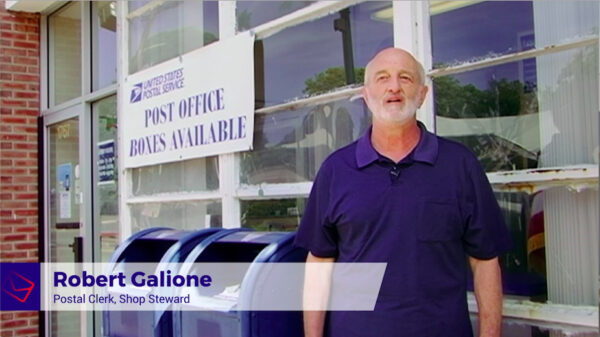MAPLEWOOD, N.J.—“I might fire you any time for no reason,” retired postal worker Robert Galione recalls his boss telling him, in his son Jay’s documentary The Great Postal Heist, released in January
Galione, an American Postal Workers Union shop steward at the Maplewood, N.J. post office, was suspended without pay in 1997, charged with padding his mileage-expense reimbursements by about $1 a week over a 10-year period. After more than a year out of work, he was exonerated with full back pay. “Management knew they didn’t have a case,” he says in the film.

“What happened to him was happening everywhere,” Jay Galione says as narrator.
As an active shop steward, “he had kind of painted a target on himself, for being a defender of workplace rights,” the younger Galione, a documentary filmmaker, told LaborPress. He says that when he began working on the film in 2008, he wanted to document the culture of bullying that developed in the U.S. Postal Service after it was converted from a public service to a public corporation, after the great wildcat strike of 1970 — the largest in U.S. history — forced the federal government to give postal unions the right to collective bargaining.
One postal supervisor says in the film that his bosses instructed him to pick out his best worker and give them a written warning, to show the others. A worker recalls bosses “barking at you, screaming at you.”
That culture of bullying precipitated several episodes of “going postal” — fired or disciplined workers shooting their bosses and anyone else within range, the worst when one killed 16 people in Edmond, Oklahoma, in 1986. After beginning with a montage of mail carriers trudging through snowy streets and sorting machines spitting out rivers of envelopes, the film segues to a pileup of news reports on these massacres, with veteran postal workers recalling that they warned someone was about to snap. But it focuses on a more private tragedy, the suicide of mail carrier Steve Spencer, who hanged himself in the men’s room of the Gastonia, N.C. post office in 1989.
Coworkers told Galione that Spencer, normally smiling and outgoing, was relentlessly followed by management, and that it tried to erase the records of him clocking in the day he killed himself, to avoid having to pay his widow compensation.
“It was really an exploration to find out, ‘why the Postal Service?’ Why is there this history of violence, what causes it?” Galione says.
Workers were generally afraid to talk, he says, for fear of retaliation. “But there were people who bucked that trend and who didn’t care, who had a truth to tell and felt like ‘this is my right to say it, they’re not going to be able to take any kind of legitimate job action against me, because I’m talking to the press or a filmmaker about what’s going on.’”
While making the film, he told LaborPress, he learned about the Postal Accountability and Enhancement Act, the 2006 law that forced the Postal Service into deficit by requiring it to spend more than $5 billion a year prepaying retirees’ health care and pensions, and later efforts to privatize and downsize services — so the project evolved into “the story of the union and maintaining a public service that was under attack.”
Rep. Stephen Lynch (D-Mass.) says the 2006 law was motivated by “malice,” the desire to get rid of the “union environment.” One of its main advocates was former Rep. Darrell Issa, a pugnacious and corrupt Southern California Republican. (In a detail not mentioned in the film, Issa has vexed thousands of city dwellers: Talking car alarms use his voice.)
The 2006 law was followed by further privatization and service reductions. Companies like FedEx and Pitney-Bowes now do mail-sorting and long-distance shipping for their customers, all but the most costly “last mile” of delivery, although protests by postal workers stopped a deal to have Staples stores sell stamps and accept packages. Drastic cuts followed the recession of 2008, with more than 200 postal facilities moved or closed. The sorting facility in Newburgh, N.Y. was downsized in 2015, so most of the mail going through it has to be trucked to Albany, 90 miles away. Santa Monica, California’s post office, a 1930s architectural treasure in a plaza that had become a community gathering spot, was sold to a developer in 2013. Further reductions in mail service were announced last year by Postmaster General Louis DeJoy, a Trump appointee.
“It was a challenge to figure out how to make it a complete story,” says Galione, how to tie together the story of workplace conditions with that of “the larger macroeconomic conditions that were being imposed on the workforce. There was a lot to fit in.”
The Great Postal Heist is also a love letter to America and its mail service. “This has existed since the beginning of our country,” marvels Paul Alexander, then a leader of the National Association of Letter Carriers on Staten Island. It’s full of images of letter carriers and post offices in small towns, suburbs, and big-city rowhouse neighborhoods, from Southern mill towns like Gastonia to the rolling hills of the Hudson Valley and the Greek columns and broad stone steps of Manhattan’s main post office.
“I really wanted to illustrate all these different places,” Galione says. “The point really was to show that this operation can’t be run from Washington, D.C. by some suits in a boardroom, that it’s very important to have decentralized control of the Postal Service, led by the people who are seeing it through in all these unique places.”
The film also raises the question of whether postal workers could do a better job if they ran it themselves. “We could definitely run it,” declares Tiffany Foster, the American Postal Workers Union’s Northeast regional coordinator. When she worked at the West Farms post office in the Bronx, “we ran our station. You knew what your assignment was every day.”
Solidarity, “to stand up with the people you work with,” is its ultimate message, Galione says. “Even if you don’t find yourself the target today, it’s important to make sure that the people you’re working alongside’s rights aren’t trampled on, so that it’s not you next week. The tragedy with Steve Spencer, with a lot of these people who went postal, were just people who felt they didn’t have a voice, they were silent too long, until it boiled over into a rage. So make your voice heard earlier than that.”





